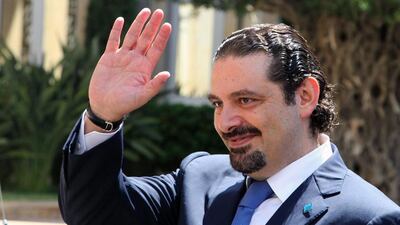I may have been too quick to condemn last week. I argued that it was a bit cheeky of the Lebanese prime minister Saad Hariri to blame Lebanon’s woeful infrastructure shortcomings on the 1.5 million refugees displaced by Syria’s civil war instead of fessing up to Lebanon’s chronic mismanagement and corruption. Maybe he was on to something.
If so, it’s been a while coming. Twelve years after he burst on to the Lebanese political scene in the wake of his father’s murder to become the face of Sunni anger at the assassination, eight years after he was first elected prime minister and six years after he went into self-imposed exile before returning to be given a second bite at the premiership, we might just be witnessing the coming of age of Saad Hariri.
Last week Nadim Munla, one of his senior advisers, spoke of Mr Hariri’s seven-year plan to raise low-interest loans of between US$10 billion and $12bn over the next seven years from the international community to rehabilitate his country’s infrastructure, in particular electricity, water and roads. And despite what Hizbollah might think about defending its borders from Zionist aggression, getting this done is without doubt Lebanon’s overarching priority. Bottom line, without a major effort to confront a sector defined by incompetence, negligence and theft, the country will not be able to attract any meaningful investment.
It all started with Mr Hariri’s call for financial help at the recent “Supporting the Future of Syria and the Region” in Brussels, which I thought was merely a good opportunity to whip out the begging bowl. But it now appears to have been part of a programme drafted by the Council of Development and Reconstruction, which will be submitted to the good offices of the international community to obtain long-term loans.
This new “Hariri Doctrine” may have been inspired by the creation at the end of last year of the World Bank’s Global Concessional Financing Facility, formed to provide long-term finance and grants for Lebanon and Jordan, the two countries most affected by the refugee crisis.
Has Mr Hariri spotted an opening to launch his own reconstruction process just like his billionaire father, a “civilian” among the civil conflict warlords who rode into town in 1992 and used his swagger and international clout to back the rebuilding of Lebanon, and in particular the centre of Beirut? Known as Horizon 2000, the initiative had many flaws and detractors. Without doubt, the public debt that hangs around Lebanon like a millstone can be traced back to the massive spending the programme incurred (Hariri Senior had banked on the money being recouped by the arrival of millions of Arab tourists who would use Lebanon as their neighbourhood playground), while Solidere, the company created and owned by Hariri and other investors to oversee the reconstruction process, has since become a byword for disappointment.
Even though Hariri Senior’s motives were honourable and he was relatively honest, the era was seen through Lebanon’s toxic, sectarian lens as a power grab by the Sunni community.
So what hope for “Sheikh Saad”, who by popular consent lacks his dad’s charisma and obsession with hard work and results? He has a reputation as a bit of a “fils-a-papa”, the playboy who abandoned Lebanon for Saudi Arabia when the going got tough and yet was seen as the best candidate to succeed Taman Salam, the previous incumbent.
But I would wager that all this would be water under the proverbial bridge if Mr Hariri did indeed raise the money to finally fix Lebanon’s power and water issues, a feat that would arguably eclipse his father’s achievement given the across the board, feel-good factor 24-hour electricity and plentiful water would achieve.
Mr Hariri must know that left to their own devices the Lebanese don’t have the discipline to sort out a problem the roots of which have embedded themselves into the pockets of the political class and the only solution must be financed and overseen by the international community.
All the Lebanese want is water, power and slightly better broadband. As many have told me: “Let the government give us these and we can do the rest.”
Michael Karam is a freelance writer who lives between Beirut and Brighton
business@thenational.ae
Follow The National's Business section on Twitter

